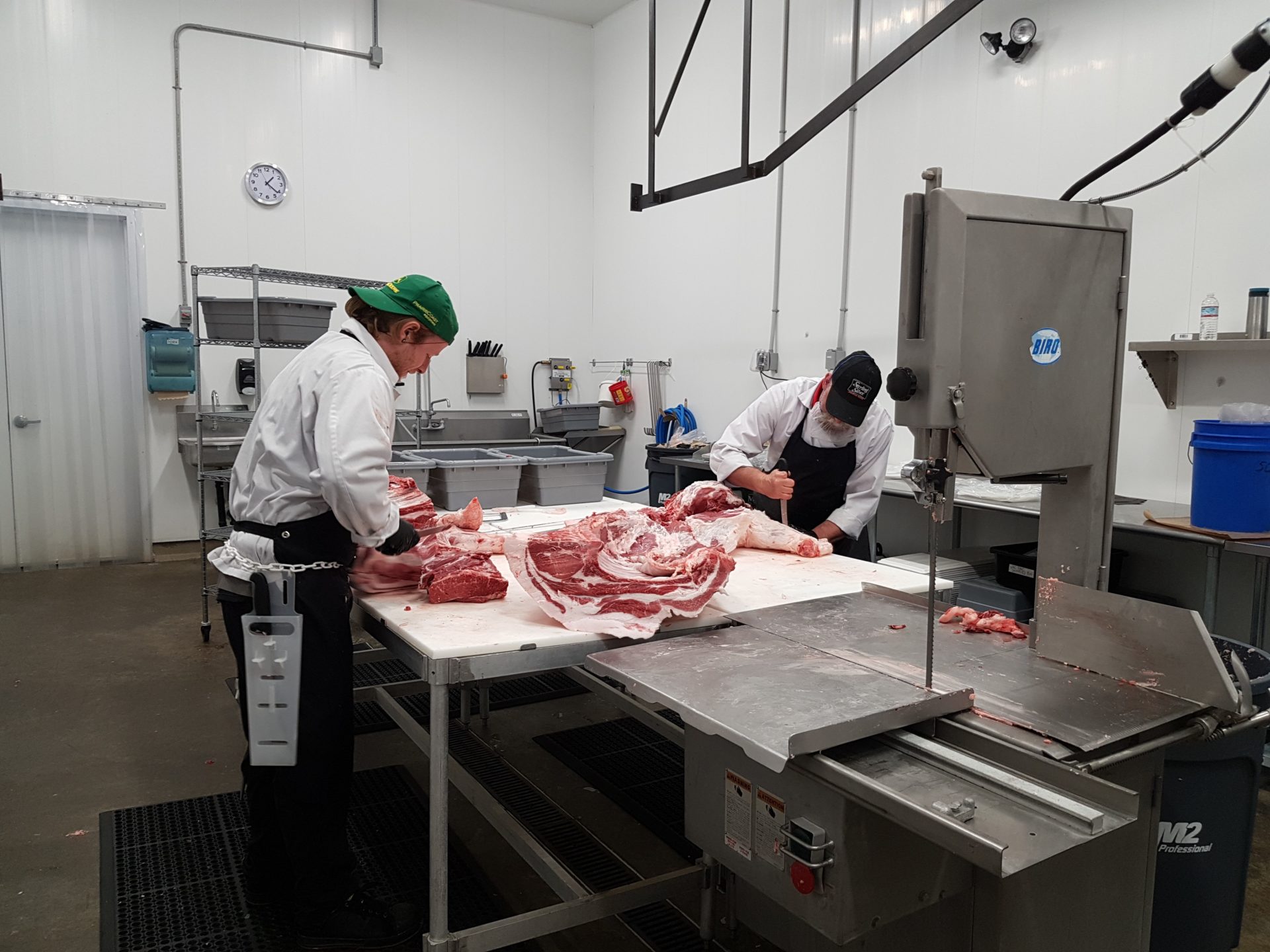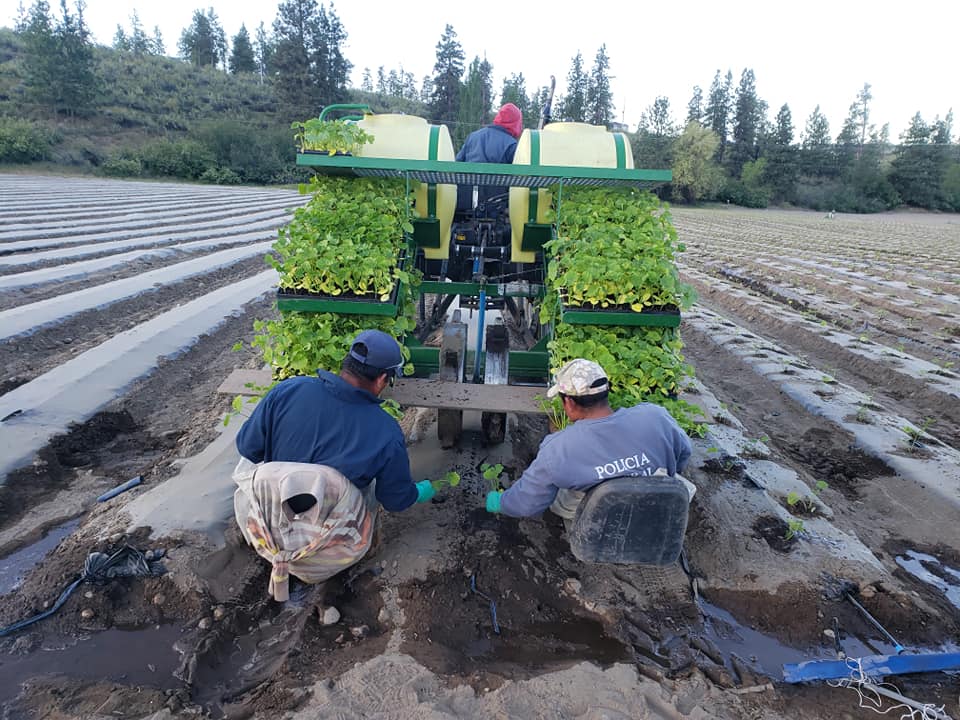by TOM WALKER
HEFFLEY CREEK – Taking the bull by the horns is something the Devick family has been doing since 1906. That’s when it first built a ranch and began running cattle in the Heffley-Louis Creek area north of Kamloops.
It often takes an independent business person to step up and fill a need in the market. While the lack of meat processing capacity has been a topic of concern in BC for a number of years, the Devick brothers and five of their sons have quietly gone ahead and built a Class A abattoir at their ranch.
“We have been doing beef sales for the last 15 to 20 years,” says Paul Devick, who gave a presentation on building a Class A abattoir at the annual general meeting of the BC Association of Abattoirs in April. “We run about 850 cow-calf pairs a year and we also have a feedlot and have been fattening our own cattle.”
A family meeting in February 2017 calved the idea for the slaughterhouse.
“The meat business has been pretty good for us selling to neighbours and friends,” notes Devick. “With our own plant, we would have everything in-house from gate to plate, eliminate the middleman and improve our bottom line along the way. We decided to move forward with the abattoir.”
Although the family wasn’t experienced in abattoir construction, it contracted Dave Charchuck and Sandra Vanderbyl to guide them and talked a lot with veteran Kamloops butcher Ron Keeley.
The first step was to work with BC Ministry of Agriculture staff and develop strategies related to marketing, business development, risk management and labour management.
“This was a very helpful exercise to see if we should carry forward,” says Devick. “We spent a lot of time talking and considering the ups and downs, and it still looked positive.”
They determined that half the plant would be for their own cattle. It would need to process about 12 to 15 animals daily for an annual capacity of 1,500 to 1,600 animals. The coolers would be able to hold about 70 whole beef carcasses, or 140 sides.
“We made a floor plan,” says Devick. “We had a limit of 6,000 square feet and it took probably 10 different plans before we got the [processing] flows right.”
He says they also developed HACCP (Hazard Analysis and Critical Control Points) and standard operating procedures.
Deciding what type of building to construct was where the fun began, continues Devick.
“We looked at a stick-frame and we looked at concrete,” he recalls. “In the end we went with SIP [structural insulated panels].”
Permits and licences were required before a shovel could be put in the ground.
“This is a very important step to be taken care of first,” he emphasizes.
The licences included one for water extractions, a water treatment permit, zoning and building permits, an abattoir licence, a licence to construct a compost system for waste disposal, a sewage disposal permit and, of course, a business licence.
The family acted as their own general contractor and picked trades they could work alongside, which saved money.
“Challenging but worth it,” says Devick. “But check out your contractors. We had a range from very good to one guy who was smoking a joint on his lunch break.”
Ranch equipment was used to move earth and prep the site.
“Make sure you get a geotech survey for your site,” cautions Devick, who said the one he got flagged the need to remove truckloads of clay before construction began.
Other challenges included starting construction in September 2017 and having to work through the winter, something he doesn’t advise. A mix of old and new equipment means that not everything works with the same ease.
On the plus side, labour has not been an issue.
“We feel we are quite lucky with the Kamloops labour base; we have been able to find good help,” he says. “We have one worker who has completed the Thompson Rivers University meat-cutting program and we have another one coming from the program next month.”
Devick says the ranch is now able to manage animals all the way from breeding to the butcher’s block, making them better able to satisfy customers. This hasn’t stopped them from buying animals to meet demand, however.
“It is a challenge having animals available all year round and we do buy some in the summer months,” he says.
A 900-pound calf going into their feedlot takes about three months to reach a 1,200 to 1,300 lb. slaughter weight. The animals are usually spoken for when they enter the yard, part of the ranch’s marketing program.
After their first kill in August last year, they were right into the fall run.
“It’s been a big learning curve but I think it is working well,” Devick says. “For the future, we are planning to move towards more value-added when we get the smoker and the sausage kitchen up and running. We have also looked at the possibility of doing a pet food line to try to reduce our waste and improve our bottom line.”
Devick says one of the keys to the successful start was being able to talk to other plant operators in the province about how to make things work.
“It’s great to have the support of your business associates and this association. They sure helped us a lot,” he said, gratefully.


 Bill 15 could be delayed
Bill 15 could be delayed